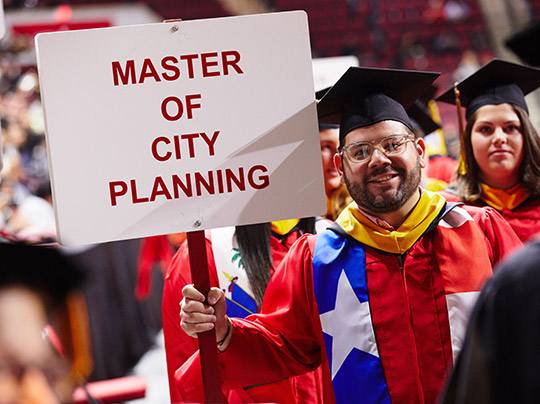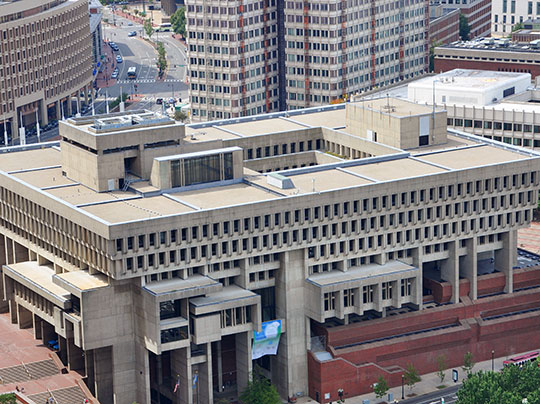Prepare for the Future of City Planning
The Master of City Planning (MCP) at Boston University’s Metropolitan College (MET) will prepare you for a wide variety of professional roles in urban planning and management.
The city planner, now more than ever, has the opportunity to address some unique challenges. Apart from the technical, socio-political, and economic considerations that go into making an equitable, resilient and sustainable city, public health considerations related to climate change—from drought to flooding—and recurring global pandemics such as COVID-19 have further widespread implications. Planning for what comes next requires expertise in complex issues and policy areas that include environmental sustainability, climate mitigation and adaptation, housing and community development, transportation planning, and applied urban informatics.
Program at a Glance
- On Campus
- Part-Time or Full-Time Study
- 48 Credits
- 12—36 Months to Completion
- 2 Core Faculty
- No GRE/GMAT
- Tuition & Fees Range—Part-Time Study*: $33,560-$45,460
*Based on 2024–2025 Boston University tuition and fees. Merit scholarship may reduce cost.
Advance Your Career and Make a Difference
Through a curriculum that embraces sustainability, creativity, pragmatism, and diversity of thought, BU MET’s City Planning program trains critical, open-minded thinkers, and inventive problem solvers who can apply their knowledge to the most pressing social, economic, and political issues facing the world. With access to a network of area and regional employers, policymakers, and analysts, graduates of the MCP are uniquely positioned to make a positive impact in the field, and have worked as town and city planners, city managers, community development directors, transportation specialists, research analysts, and policy experts in federal, state, and local governments; nonprofit and nongovernmental organizations; corporations; and research institutions.
Sample Job Titles
Planner
- Urban and Environmental Planning Policy
- Transportation Planner
- Community Development Planner
- Regional Planner
- City/Town Planner
- Land Use Planner
- Transit Planner
- Economic Development
Outreach, Diversity, and Inclusion
- Diversity Programs and Outreach Director
- Stakeholder Management
- Manager of Diversity, Equity, and Inclusion
- Community Engagement Specialist
Sustainability/Climate Resiliency Planner
- Environmental Specialist
- Sustainability Specialist
- Parks and Open Space Planner
- Sustainability Outreach Manager
- Food and Urban Agriculture Coordinator
Analyst
- Spatial/GIS Analyst
- Policy/Public Affairs Analyst
- Transportation Analyst/Specialist
- Analyst/Specialist Traffic Analyst
- Land Use Analyst
- Real Estate Development Analyst
- Capital Program Planning Analyst
- Public Finance and Budget Analyst

Request Information
Receive more details about your program of interest.
Learn More
Why Earn a Master’s in City Planning at BU?
- Active Learning Environment: BU’s City Planning courses focus on practical, hands-on education and include a public capstone project, ensuring that you are immersed in all aspects of city planning—education you can apply on the job.
- Career Counseling: MET’s Career Development office and BU’s Center for Career Development offer a variety of job-hunting resources, including one-on-one career counseling by appointment for both online and on-campus students.
- Engaged Faculty: In BU’s City Planning master’s program, you benefit from working closely with highly qualified faculty who draw from active research and extensive field experience in areas including sustainable development, climate change, transportation, land reclamation, city finance, data analytics, infrastructure planning, regional economics, and urban design.
- Extensive Network: Study complex issues alongside peers with solid urban planning and policymaking experience, learn from faculty who have valuable contacts in the field, and benefit from an alumni community with strong professional connections.
- Student Support: Enjoy an exceptional student-to-instructor ratio, ensuring close interaction with faculty mentors and access to support.
- Valuable Resources: Make use of Boston University’s extensive resources, including the Center for Career Development, Fitness & Recreation Center, IT Help Centers, Mugar Memorial Library, Frederick S. Pardee Center for the Study of the Longer-Range Future, Center for Antiracist Research, Initiative on Cities, Howard Thurman Center for Common Ground, George Sherman Union, and many others.
- Flexible Options: Study at the pace that works for you, with multiple on-campus class times that include evenings, and courses that begin fall, spring, and summer.
- Track Record: Learn from the best—BU MET has been offering the Master of Urban Affairs since 1969. The Master of City Planning was introduced in 1978.
- Merit Scholarships: US citizens and permanent residents are automatically considered during the application process and nominated based on eligibility. Learn more.
Learn to Solve Challenges in Planning, Urban Management, and Public Policy
The Master of City Planning (MCP) is offered through BU MET’s Department of Applied Social Sciences, which oversees several graduate programs focusing on the challenges of the urban environment, including the Master of Urban Affairs (MUA), the Graduate Certificate in Applied Sustainability, the Graduate Certificate in Applied Urban Informatics, and the Graduate Certificate in Urban Policy & Planning.
BU’s City Planning & Urban Affairs programs prepare future leaders, practitioners, and innovators for the myriad challenges that arise in urban planning and policymaking. Students consider the political, social, and technical implications of each facet of planning and policymaking, and thus grapple with the fact that there are few, if any, simple solutions or approaches to urban issues.
The Master of City Planning and Master of Urban Affairs programs share a required, five-course core curriculum, and each provide a rigorous foundation for both new and experienced student-scholars and professionals.
Graduates can pursue a wide range of professional careers in town, city, and regional planning; sustainable management; community and economic development; transportation planning; public-sector/nonprofit management; and policy research, among others.
Graduate with Expertise
Boston University’s City Planning master’s degree will equip you to:
- Understand and apply knowledge of the history and theory of urban and regional development, the structure and functions of urban systems, local and national policymaking processes, and the role of planning to create sustainable outcomes.
- Explain and assess the economic, environmental, political, social, and equity issues inherent in policy work and planning practice.
- Apply quantitative and qualitative research skills to theory-building, data-gathering and analysis, and planning and policy-making processes.
- Create relevant policy and planning solutions that incorporate the diverse perspectives of various stakeholders, including those of minority and disadvantaged communities.
- Mediate and communicate effectively in public (community) and policy settings.
Certificate-to-Degree Pathway
BU MET graduate certificate programs can serve as building blocks to a master’s degree. The Graduate Certificate in Applied Sustainability and the Graduate Certificate in Urban Policy & Planning each share specific courses with the Master of City Planning program, giving you the option to take one or two certificates on your path to a master’s degree. Students currently enrolled in a graduate certificate who are interested in transitioning into a master’s degree should contact their academic advisor to declare their interest in this pathway. A new master’s degree application is not required. Connect with a graduate admissions advisor at apssadmissions@bu.edu to learn more about this option.
Master of City Planning Curriculum
In addition to the below courses, students are also required to maintain an e-portfolio of the work they produce throughout the program. For more information, please visit this page.
The Master of City Planning (MCP) requires the completion of 48 credits. Students are encouraged to participate in the Directed Internship Program for course credit through MET UA 804 Supervised Fieldwork or the World Cities Fellows Program for course credit through MET UA 701.
Core Requirements
(Five courses/20 credits)
MET UA 515 History, Theory and Planning Practice
Fall ‘24
History, concepts, and methods of contemporary urban and regional planning practice. Governmental, nonprofit, and private settings of professional planning; plans, research, and policy development; uses and implementation of planning. Political analysis of planning issues, such as comprehensiveness, public interest, advocacy, negotiation, and future orientation. Case materials drawn from redevelopment, growth management, land use conflicts, and service delivery. [ 4 cr. ]
MET UA 703 Urban Research Methods
Fall ‘24
Mixed-Methods Design for Urban Research is intended to develop skills in the evaluation and utilization of quantitative, qualitative, and mixed-methods approaches to scholarship in social-science research. The course will explore survey, experimental, observational, interview, ethnographic, and case-study research methods in depth, and students will learn how to collect, organize, and evaluate data in various forms. Students will create a fully developed research proposal drawing upon mixed-methods techniques to investigate a topic of interest. [ 4 cr. ]
MET UA 704 Urban Economics
This course provides basic understanding of economics and approaches urban problems and planning issues from economic perspectives. It explores how microeconomic theories and models can help us understand how cities and regions function, analyze urban problems, and evaluate urban policies. This is a broad introductory survey course, focusing on how "microeconomic" actors including business firms, households, and nonprofit and government institutions - organize to provide for the sustaining and flourishing of life. [ 4 cr. ]
Plus one from the following pair:
MET UA 664 Planning and the Development Process
Fall ‘24
This course specifically explores the area where the private and public sectors meet so that the student can develop an awareness of the complexity of dealing with these often competing interests. The objective of the course is to give the student an understanding of the motivations of the private sector in the way they go about creating their products and projects and to leave the student with the tools and knowledge to successfully negotiate the Public Interest with the Private Needs. [ 4 cr. ]
MET UA 715 Planning and Land Use Law
Planning, zoning, subdivisions, eminent domain, exactions, impact fees, and other land use controls: what are they, how do they operate, what are the limitations on their use? In this course, we will explore the use of those tools for planning and development and read and understand the important U.S. Supreme Court and state court decisions that have shaped and continue to influence planning and land use throughout the country. We will see the connection between land use controls and court decisions and how each has evolved to meet changing conditions and goals. We will also review the structure of the U.S. legal system and create a framework for understanding constitutional requirements on eminent domain, due process, and equal protection from a planner's perspective. [ 4 cr. ]
And one more from the following pair:
MET UA 761 Planning Thesis
Topic must be approved by designated instructor or advisor. For M.C.P. students only. Application of program coursework and independent research to a selected topic individually arranged. [ Var cr. ]
MET UA 805 Urban Studies Capstone
The capstone course integrates the principles and applications of the major area of study of City Planning, Urban Affairs and Public Policy. During the course of the semester, students are required to work in groups to complete a comprehensive project which serves as an evaluative tool for student achievement for the major learning goals of the Programs. The course is primarily student driven, and is aimed to foster interdisciplinary partnerships and help cultivate industry alliances and cooperation. Recognizing the unique and diverse characteristics of the Boston urban environment, the capstone projects will be drawn from a range of topical issues that are currently ongoing in the greater Boston metropolitan area. The project-based course emphasizes the interdisciplinary nature of city planning and urban affairs and provides students the direct opportunity to gain experience with real-world projects and stakeholders. [ 4 cr. ]
Electives
(Seven courses/28 credits)
Electives should constitute a coherent concentration within the general curriculum. Additional courses may be approved in consultation with the department.
Sample of City Planning Elective Courses
MET UA 503 Housing and Community Development
Fall ‘24
Surveys the factors affecting supply and price of urban housing. Examines federal, state, and municipal programs, as well as future policy options, from the standpoint of housing quality and community development goals. Analysis of selected international comparative experience. [ 4 cr. ]
MET UA 508 Real Estate Development
Various factors affecting location, construction, financing, and marketing of real estate in metropolitan areas. Studies the relationship of public policy to the activities of the private sector, market analysis techniques, evaluation of development projects, and problems of real estate investment. [ 4 cr. ]
MET UA 509 Public Finance and Urban Infrastructure
Economic, social, and political aspects of state and local government finances. Theory of public finance; revenues, expenditures, and survey of budgetary processes. Planning techniques in capital budgeting and other finance activities. Selected issues: debt, user fees, property taxes, and incentives. [ 4 cr. ]
MET UA 510 Selected Topics in Urban Affairs
Summer ‘24
UA510 is the designation for "Special Topics in Planning". The subject matter for UA510 courses changes from semester to semester, and more than one UA510 can be offered in a given semester. [ 4 cr. ]
MET UA 521 Environmental Law, Policy, and Justice
This course is designed to present a comprehensive approach to environmental law, policy, and justice at all levels of government, including federal, state, and local governments. Principles and status of environmental law for pollution control and environmental improvement. Impact statements, resource conservation and protection, growth management. Emphasis on air, water, land, and hazardous waste issues, environmental, economic, and other policy relationships. Case materials and court decisions will be used. [ 4 cr. ]
MET UA 523 Skills and Techniques in Planning
Students introduced to specific skills and techniques to help them achieve community and urban planning goals. The course covers a range of communications skills, including oral, written, visual, and using social media in planning to help planners develop concise, understandable plans and documents. Grant research, writing, and administration will be discussed. Segments on community outreach and engagement and how to build equity and cultural competency will be explored. Students will be introduced to skills in designing and implementing community meetings, including facilitation skills and managing group dynamics. [ 4 cr. ]
MET UA 526 Multi-modal Transportation Planning and Design
Using a blended seminar and design studio format, this course equips students with the knowledge and skills necessary to participate in transportation planning processes and to develop conceptual designs for multimodal transportation networks. Students learn the history, theories, principles, and design standards of multimodal transportation planning, developing and practicing design skills during studio sessions. Readings include academic literature; government plans and reports; news articles; construction plans; as well as design manuals and guidelines for designing pedestrian, bicycle, micromobility, and transit infrastructure, and for integrating different types of transportation into urban environments. Class sessions are supplemented with site visits, guest presentations, and case studies drawn from the local, state, and national level. [ 4 cr. ]
MET UA 580 Boston Experience: The Role of Architecture in Creating the Sense of Place
The Boston Experience is a graduate and advanced undergraduate course designed in the seminar format. The course will provide an introduction to the study of architecture as an important foundation for students of urban affairs and city planning and as an important foundation for students in other disciplines such as civil engineering, historic preservation, and the applied social sciences (such as sociology). The course will also serve as a foundation of the basic concepts and a general overview of the field of architecture. This foundation will also provide a prerequisite for the two advanced studio planning courses currently offered at MET in the Department of Urban Affairs and City Planning (UA 613 and UA 510). [ 4 cr. ]
MET UA 590 International Comparative Development and Urbanization
Examination of a selected country, region, or city in relation to issues of urbanization and development planning. Emphasis on comparative analysis of policy, techniques, conditions, issues, and effectiveness. Topics and international subjects vary. Consult the department for details. [ 4 cr. ]
MET UA 610 Urban Environmental Issues
This course is designed to present a comprehensive approach to urban environmental issues by integrating environmental planning and policy. It is intended for both students with and without planning background. This course provides a broader view and discussion of natural resources planning relating to issues affecting urban watershed management. This approach includes water policy, sustainability of water resources, freshwater planning (Lakes and Rivers), coastal waters, open space protection, stormwater management, clean water act, wetland protection, low impact development, and stakeholder involvement with a focus on the means and techniques available to local governments to plan and protect watersheds. Case studies will be used to demonstrate the potential to address full range of urban watershed issues, including water supply planning, water quality restoration and protection, open space planning, habitat protection and ecological conservation, and enhancement and regulatory activities. [ 4 cr. ]
MET UA 613 Urban Design and Development
Fall ‘24
The role of urban design in the community development process. Examines human behavior, aesthetic foundations of design methods, citizen/client participation, and public policy issues. Analysis of actual community spaces. Student design exercises. [ 4 cr. ]
MET UA 617 Actionable Sustainability
Fall ‘24
Sustainability generally refers to the ability of "systems" to be maintained such that they remain viable over long periods of time. As much as achieving the perfect sustainable equilibrium may be the ideal, it is important to recognize that there will be competing and conflicting interests, especially within complex hierarchical social, economic and ecological systems, particularly in light of ongoing climatic change. This field intensive course draws on the practices and theories of sustainability and climate change to understand what sustainability can mean in different contexts, and, more important, how nuanced, sustainable solutions can be achieved under varying conditions and in different systems. With an emphasis on the urban environment, the course will consist of projects in which students will identify, analyze, and develop practical proposals to real world issues. This course is intended for a wider audience from a range of disciplines. [ 4 cr. ]
MET UA 619 Urban Transportation Policy and Planning
Fall ‘24
This course will provide students with a broad introduction to important concepts and policy issues in transportation, principally at an urban and metropolitan level. In addition, the course will explore methods planning practitioners can use to analyze transportation problems and propose solutions. The course will use specific examples of planning initiatives (both operations and capital) from transportation agencies within the Boston Metropolitan region. Guest speakers from local, regional, and state transportation agencies within the Greater Boston Metropolitan area will supplement the instructor's lectures and assigned readings. [ 4 cr. ]
MET UA 627 Smart Green Cities
Smart Green Cities examines the three elements of "sustainability" and their application to guide decisions about development, investment, and the role of government, particularly at the city level. Through comparative study of a range of sustainable practices in important subfields of planning, such as transportation, land use, and energy, students will learn about the crucial role cities play in addressing equity and other social concerns, environmental challenges, and global climate change, the constraints and opportunities cities face, and how to effectively address them. Recognizing their increasing importance, the course will focus on the use of data and technology as tools to advance more sustainable land development, travel, energy, natural resources, and other decisions. Finally, particular attention will be given to the practical application of land use planning techniques. The course includes lectures, discussions, case studies, and student presentations. [ 4 cr. ]
MET UA 629 Urbanization and the Environment
Interrelationships between physical environment and processes of urbanization. Case studies develop historical perspective on social, economic, and physical aspects of the quality of urban life. Special attention to the preparation of environmental impact statements and assessment of urban environmental quality. [ 4 cr. ]
MET UA 654 GIS and Spatial Analysis
Fall ‘24
Geographic Information Systems for Planners provides an introduction to Geographic Information Systems (GIS) specifically with a focus on applications in urban planning. The role of spatial analysis in local, state and regional planning has steadily increased over the last decade with the infusion of windows-based GIS software such as ESRI ArcGIS. The class focus is to prepare students to feel comfortable communicating with other GIS users, research spatial data, and produce high quality digital maps in an applied learning environment. [ 4 cr. ]
MET UA 664 Planning and the Development Process
Fall ‘24
This course specifically explores the area where the private and public sectors meet so that the student can develop an awareness of the complexity of dealing with these often competing interests. The objective of the course is to give the student an understanding of the motivations of the private sector in the way they go about creating their products and projects and to leave the student with the tools and knowledge to successfully negotiate the Public Interest with the Private Needs. [ 4 cr. ]
MET UA 701 Urban Problems and Policy Responses
Major problems confronting urban areas and the process of policy formulation and implementation. Emphasis on problem interdependence and systems characteristics. Analysis of problem definitions (housing, crime, poverty, etc.), goals, public/private responsibilities, existing programs, and policy options. Analysis of selected, comparative international experience. [ 4 cr. ]
MET UA 715 Planning and Land Use Law
Planning, zoning, subdivisions, eminent domain, exactions, impact fees, and other land use controls: what are they, how do they operate, what are the limitations on their use? In this course, we will explore the use of those tools for planning and development and read and understand the important U.S. Supreme Court and state court decisions that have shaped and continue to influence planning and land use throughout the country. We will see the connection between land use controls and court decisions and how each has evolved to meet changing conditions and goals. We will also review the structure of the U.S. legal system and create a framework for understanding constitutional requirements on eminent domain, due process, and equal protection from a planner's perspective. [ 4 cr. ]
MET UA 801 Graduate Directed Study in Urban Affairs and Planning
Limited to a maximum of 8 credits toward the degree requirements. Approval by program director required prior to registration. Study of urban and public affairs and planning individually arranged between student and instructor to provide training opportunities not available elsewhere. [ 4 cr. ]
MET UA 804 Supervised Fieldwork
Limited to a maximum of four credits toward the degree requirements. Approval by program director required prior to registration. Students spend a minimum of 5 hours per week working with public agencies, community groups, or private organizations, during the semester. [ 4 cr. ]
Course Waivers for Related Programs
Master of City Planning students may pursue a certificate program in Commercial Real Estate or Real Estate Finance at Boston University’s Center for Professional Education (CPE). MCP students who earn a CPE certificate in Commercial Real Estate or Real Estate Finance will be granted a waiver of two graduate-level elective courses (8 credits) toward their degree.
City Planning & Urban Affairs Faculty
Tuition & Financial Assistance
Competitive Tuition
Our part-time rates are substantially lower than those of the traditional, full-time residential programs yet provide access to the same high-quality BU education.
Learn More
Comprehensive Financial Assistance
Our services include
scholarships, graduate loans, and payment plans.
Learn More
How Much Does This Program Cost?
BU MET Programs offer the flexibility of part-time or full-time study. Tuition, fees, and total program cost are determined by enrollment status. If you enroll in 1–2 courses (4–8 credits) in a semester, you are charged the part-time per-credit rate. If you enroll in 3–4 courses (12–16 credits) in a semester, you are charged the full-time semester rate.
Master of City Planning (On Campus)
| Enrollment Status |
Part Time |
Full Time |
| Courses per Semester |
2 courses
(8 credits) |
4 courses
(16 credits) |
3 courses
(12 credits) |
| Time to Degree |
6 semesters
(24 months) |
3 semesters
(12-16 months)*** |
4 semesters
(16-20 months)*** |
| Tuition* |
$550-$975
per credit** |
$33,335
per semester |
$33,335
per semester |
| Fees per Semester* |
$60 |
$478 |
$478 |
| Total Degree Cost* |
$33,560–
$45,460 |
$101,439 |
$135,252 |
*Based on 2024–2025 Boston University tuition & fee rates.
**Cost per credit is determined by course number (100–599 = $550/credit, 600–999 = $975/credit).
***Summer semester enrollment is not required for international students to maintain F-1 visa status. Enrollment in summer semester coursework will expedite completion of program and reduce total program cost.
International students seeking an F-1 visa for on-campus study must enroll full time and demonstrate availability of funds to cover the Estimated Cost of Graduate Study; those who wish to study online may enroll part-time but are not eligible for a visa. Learn more about International Student Tuition & Fees.
Questions? Please contact us to hear from an Admissions Advisor who can help you determine the best enrollment pathway. For information regarding financial aid, visit BU MET’s Financial Aid page.
Get Started
Please visit the BU MET admissions page for details on how to apply, financial assistance, tuition and fees, requirements for international students, and more.
Apply Now
News & Events
Events
July 15th, 2024
at:
6:30pm - 9:30pm
Curated Cuisine: Redefining Chinese American recipes with Jon Kung
Details
Events
July 16th, 2024
at:
1:00pm - 1:45pm
The Inside Scoop: BU MET Graduate Admissions for Domestic Students (US Citizens & Permanent US Residents)
Details
Events
July 25th, 2024
at:
12:00pm - 12:45pm
Online Graduate Study at Boston University
Details
Back to Programs











